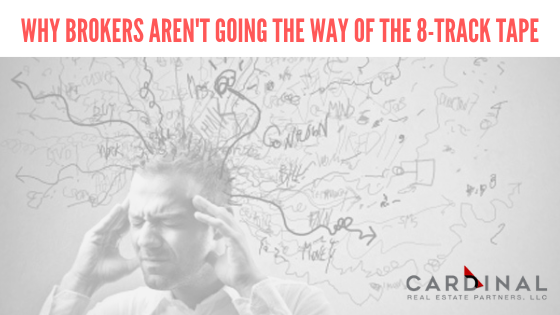
I get asked a lot about my future as a commercial real estate broker. Friends and colleagues wonder about the need for a professional broker when there is so much information out there about real estate that people can find on their own. And not only are more groups putting out information, (e.g. CoStar and Reonomy), people have become much more savvy about searching through that information. So I hear a lot from people wondering whether the profession of commercial real estate broker is going to go the way of the 8-track tape.
No doubt, this is an industry that has been disrupted by the internet. Brokers were once the gatekeeper if valuable information, and now decision makers can access much of the same information themselves.
However, I’m finding I’m needed as much, if not more so, precisely because of how much information is available. Two words: Information overload. The amount of data that one can find with a simple Google search can be overwhelming, and overflowing Excel spreadsheets don’t necessarily provide the context that is so valuable when one is making a decision.
As I said, this information has disrupted my industry, and brokers must adapt if they want to survive. Successful brokers are evolving by adapting a more consultative business model, instead of one focused on being a gatekeeper. This is a change you can find in the large firms and small shops alike.
A sign of this evolution is how people are paid to buy and sell real estate. The trend is going away from purely transaction fee basis and more to an agreement where longer term goals and accomplishments are aligned with compensation. For example, brokers who do business with large corporations such as Bank of America often get paid a small percentage of the transaction fee and then a larger bonus based upon key performance indicators that the client has agreed to. This keeps a broker’s interest aligned with his or her clients. (Speaking of interests: Check out the book Freakonomicsby Steven D. Levitt and Stephen J. Dubner, which talks about how sales prices change when a real estate agent is selling his or her home.)
People are valuing the experience and understanding that consulting firms can bring, especially as deals are becoming more complex. Another plus, is real estate counseling isn’t a specific discipline, such as brokerage, management or appraisal, and so when you work with a firm that is more consultative in its approach, the client is getting more critical analysis and inquiry, and generally deeper thought about the problems and potential solutions.
Honestly, it’s also what I love about real estate – having to use my years of experience and knowledge gained from hitting the streets to solve problems and devise solutions.
You can find consultants through groups such as The Counselors of Real Estate, of which I’m a member. One must be nominated to be a member of CRE, and the CRE designation is only awarded after extensive review. It’s a great group of super smart people, and a wonderful place to find some big thinkers in the real estate business.
Find CRE members in your area using the online director here, or give me a call and I can help you find someone.






